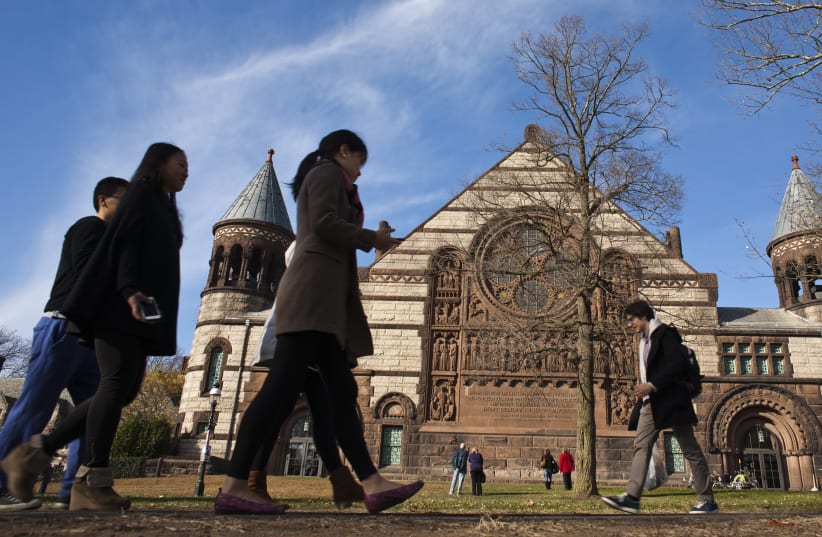There was a time, not so long ago, when universities were cathedrals of reason. Today, too many have become temples of ideological purification, where hatred is sanctified through jargon, and ancient bigotries are reborn as progressive orthodoxy.
Now, in an act as cynical as it is corrosive, Princeton University has announced plans to host a panel titled “The Anti-Zionist Idea” – a title that belongs not on a syllabus but in the footnotes of modern antisemitic propaganda.
This event has not yet taken place, but the very fact that it is scheduled, endorsed, and institutionally sanctioned speaks volumes. It is why We Believe in Israel, a British-based pro-Israel advocacy group, has launched a public petition demanding its cancellation. And rightly so. For this is not about academic freedom; it is about the mainstreaming of a libel – an old hatred reborn in the sanitized prose of scholarship.
Let us be clear from the outset: Anti-Zionism is not nuanced critique. It is not dissent. It is not peace. It is hate – Israel hate.
That is the core of anti-Zionism. Strip away the footnotes, the faculty credentials, and the carefully choreographed post-colonial lexicon, and you are left with one chilling proposition: The Jewish state must not exist.


And this, we are told, is a subject worthy of “discussion.”
Would Princeton ever dream of hosting a panel titled “The Anti-Palestinian Idea”? “The Anti-Black Nationalist Idea”? “The Anti-Kurdish Idea”? The very suggestion would be rightly met with moral outrage. And yet, when the subject is Jewish nationhood, when it is Zionism on the chopping block, the gates are flung open, and the event is dignified with academic imprimatur.
This is the hypocrisy of our age. And it is soaked in exceptionalism – the kind that only applies to Jews.
Anti-Zionism casts Zionism as the embodiment of evil
Anti-Zionism, in this context, is not merely a political stance; it is racism, refined for the academic elite. A racism that has learned to speak in the language of justice while plotting erasure. It does not protest a policy or a government; it protests the existence of a people’s national identity. In this case, it is the Jewish people.
It is a libel. And Princeton, by platforming it, is laundering that libel under the presence of inquiry.
Whereas once the blood libel accused Jews of murdering Christian children, and where the conspiracy libel accused them of controlling global finance, the new libel casts Zionism as the embodiment of evil – racist, colonial, oppressive – so grotesque that its destruction is not only legitimate but necessary.
In doing so, anti-Zionism denies the Jewish people what no other people are asked to surrender: the right to self-determination. It demands that Jews be stateless, voiceless, and vulnerable – again. It tells Jewish students on campus that their national identity is not only unwelcome but morally offensive.
That this event is being allowed to go ahead at all, while Israeli hostages are still held by Hamas, makes it all the more abhorrent. Princeton has chosen this moment to debate whether the very idea of Jewish sovereignty should be intellectually dismantled.
This is not scholarship; it is institutional complicity.
And it has real consequences. Across the United States and Europe, Jewish students report unprecedented levels of fear and alienation. Zionism has become the great litmus test for social inclusion: Renounce it and be accepted; embrace it and be shunned. This is not intellectual pressure; it is ideological coercion.
Let us be very clear: The call to abolish Israel is a call to strip Jews of the very rights that others are afforded without question. That is racism, not merely in effect but in intent. It may be dressed in academic robes, but it is the same old hatred rehearsed in a different register.
Princeton should be ashamed. And if shame does not move it, pressure must. The petition initiated by We Believe in Israel is more than a protest; it is a moral line in the sand. It is a reminder that free speech must not be confused with intellectual impunity and that there are ideas that, when platformed by institutions of learning, become acts of endorsement.
Zionism is not a crime; it is the political expression of a people’s yearning to return home. It is Jewish dignity in the form of nationhood. And if Princeton cannot defend that – if it cannot even refrain from entertaining a panel dedicated to its delegitimization – then it has ceased to be a serious institution.
We are done debating our right to exist.
Cancel the panel, condemn the libel, and make it known: Israel hate is hate, plain and simple.
The writer is the executive director of We Believe In Israel.
